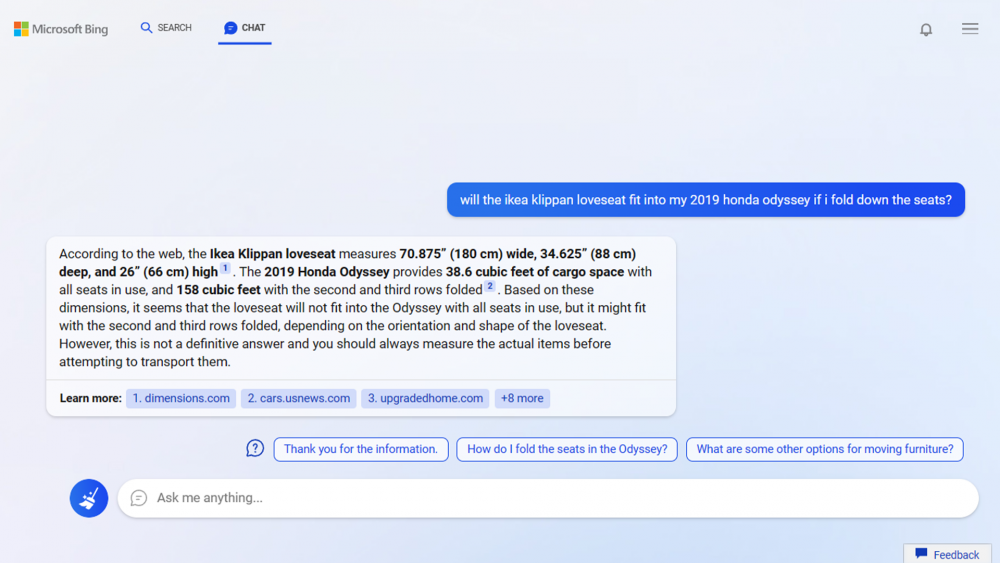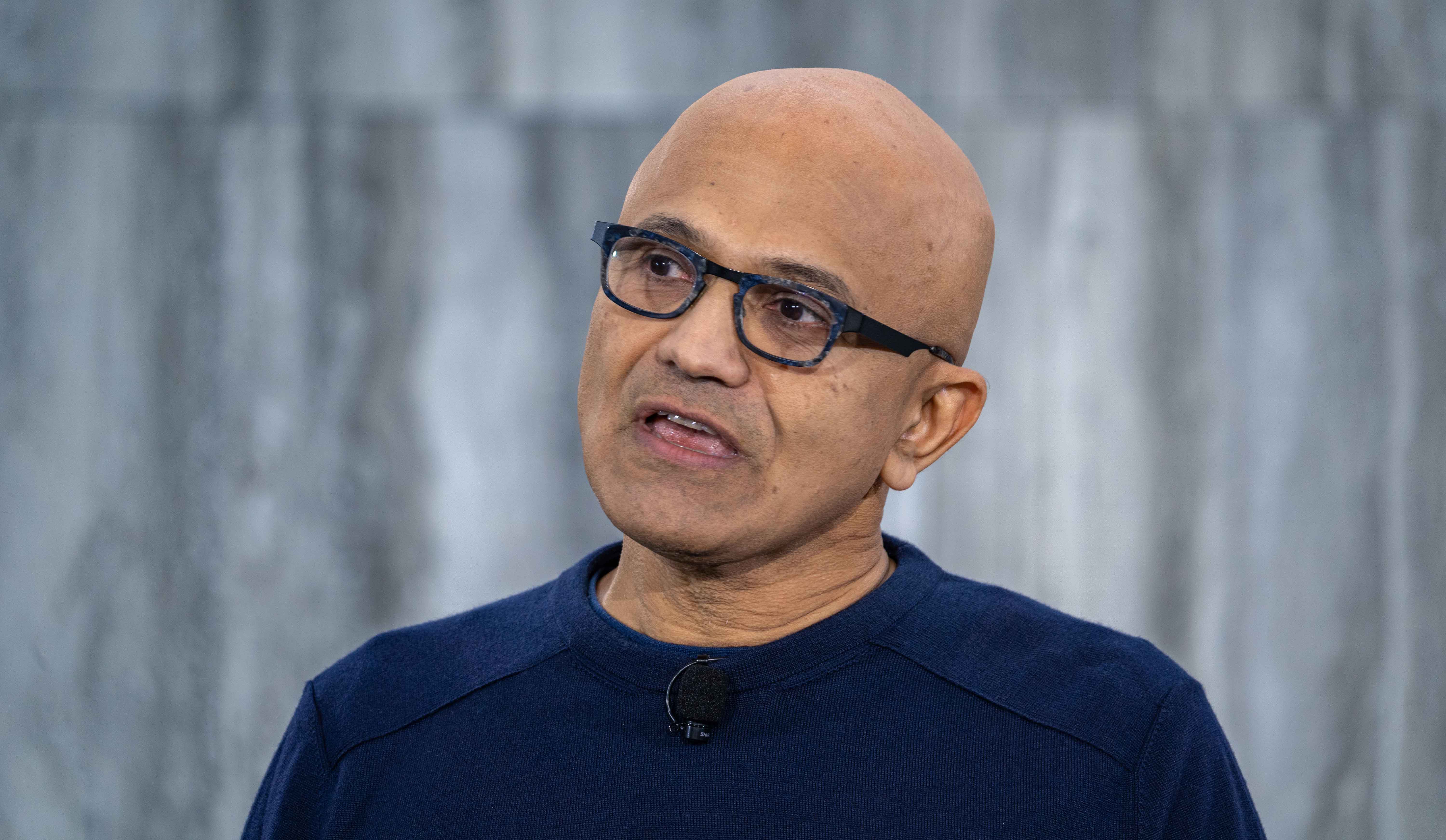Check out all the on-demand sessions from the Intelligent Security Summit here.
The “race starts today” in search, said Microsoft CEO Satya Nadella, at a special event today at Microsoft headquarters in Redmond, Washington. “We’re going to move fast,” he added, as the company announced a reimagined Bing search engine, Edge web browser and chat powered by OpenAI’s ChatGPT and generative AI.
The new Bing is available today for the desktop on limited preview. And Microsoft says it is launching a mobile version in a few weeks. There will be no cost to use the new Bing, but ads will be there from the start, according to Yusuf Mehdi, corporate vice president and consumer chief marketing officer at Microsoft.
OpenAI CEO Sam Altman joined on stage at the event: “I think it’s the beginning of a new era,” he told the audience, adding that he wants to get AI into the hands of more people, which is why OpenAI partnered with Microsoft — starting with Azure, and now, Bing.
He closed his comments by saying: “We’re eager to learn from real-world use.”
Event
Intelligent Security Summit On-Demand
Learn the critical role of AI & ML in cybersecurity and industry specific case studies. Watch on-demand sessions today.

>>Follow VentureBeat’s ongoing ChatGPT coverage<<
Microsoft announced new ‘AI-powered copilot’ experience
At the center of a new “AI-powered copilot” experience is a new Bing search engine and Edge web browser, said Mehdi.
Bing is running on a new, next-generation language model called Prometheus, he said, one more powerful than ChatGPT and one customizable for search [NOTE: So far, neither Microsoft nor OpenAI have referred to this more-advanced ChatGPT as the long-awaited GPT-4].

The Prometheus model, Mehdi said, offers several advances, including improvements in relevancy of answers, annotating answers with specific web links, getting more up-to-date information and improving geolocation, and increasing the safety of queries.
As a result, there have already been steady improvements on the Bing algorithm, he said. A few weeks ago Microsoft applied AI to its core search index and saw the “largest jump in relevancy” over the past two decades.
Microsoft says it is ‘clear-eyed’ about unintended consequences of tech

In an introduction, Nadella said that for Microsoft, these announcements are about being “clear-eyed” about the unintended consequences of technology, pointing to the company’s release of responsible AI principles back in 2016.
AI prompting, he explained, comes from human beings — Microsoft, he said, wants to take the design of AI products as a “first-class construct” and build that into our products. But that is insufficient, he added — the key is building AI that’s “more in line with human values and social preferences.”
Sarah Bird, Microsoft’s responsible AI lead, took the stage to emphasize that with technology this powerful, “I know we have a responsibility to ensure that it’s developed properly.” Fortunately, she added, at Microsoft “we’re not starting from scratch. We’ve been working on this for years. We’re also not new to working with generative AI.”
New Microsoft Bing experience
According to a Microsoft blog post, the new Bing experience is a culmination of four technical breakthroughs:
- Next-generation OpenAI model. We’re excited to announce the new Bing is running on a new, next-generation OpenAI large language model that is more powerful than ChatGPT and customized specifically for search. It takes key learnings and advancements from ChatGPT and GPT-3.5 – and it is even faster, more accurate and more capable.
- Microsoft Prometheus model. We have developed a proprietary way of working with the OpenAI model that allows us to best leverage its power. We call this collection of capabilities and techniques the Prometheus model. This combination gives you more relevant, timely and targeted results, with improved safety.
- Applying AI to core search algorithm. We’ve also applied the AI model to our core Bing search ranking engine, which led to the largest jump in relevance in two decades. With this AI model, even basic search queries are more accurate and more relevant.
- New user experience. We’re reimagining how you interact with search, browser and chat by pulling them into a unified experience. This will unlock a completely new way to interact with the web.
Announcements come as Google and Microsoft offer dueling debuts this week
The announcements come after Google and Microsoft, in separate surprise announcements, confirmed dueling generative AI debuts this week.
Yesterday, Google unveiled a new ChatGPT-like chatbot named Bard, as it races to catch up in the wake of ChatGPT’s massive viral success (growing faster than TikTok, apparently). In a blog post, CEO Sundar Pichai that Bard is now open to “trusted testers,” with plans to make it available to the public “in the coming weeks.”
In addition, the company announced a streaming event called Live from Paris focused on “Search, Maps and beyond,” to be livestreamed on YouTube at 8:30 am ET on February 8th. According to the description: “We’re reimagining how people search for, explore and interact with information, making it more natural and intuitive than ever before to find what you need.”
it was only ten weeks ago that OpenAI launched what it simply described as an “early demo” a part of the GPT-3.5 series — an interactive, conversational model whose dialogue format “makes it possible for ChatGPT to answer followup questions, admit its mistakes, challenge incorrect premises, and reject inappropriate requests.”
ChatGPT quickly caught the imagination — and feverish excitement — of both the AI community and the general public.
Since then, the tool’s possibilities as well as its limitations and hidden dangers have been well established; rumors around Microsoft’s efforts to integrate ChatGPT into its Bing search engine as well as productivity tools like Powerpoint and Outlook have circulated for weeks; and any hints of slowing down its development were quickly dashed when Microsoft announced its plans to invest billions more into OpenAI on January 23.
VentureBeat’s mission is to be a digital town square for technical decision-makers to gain knowledge about transformative enterprise technology and transact. Discover our Briefings.






